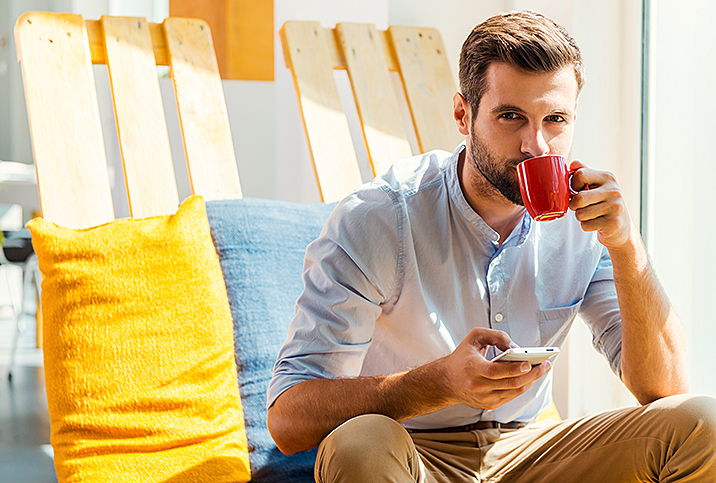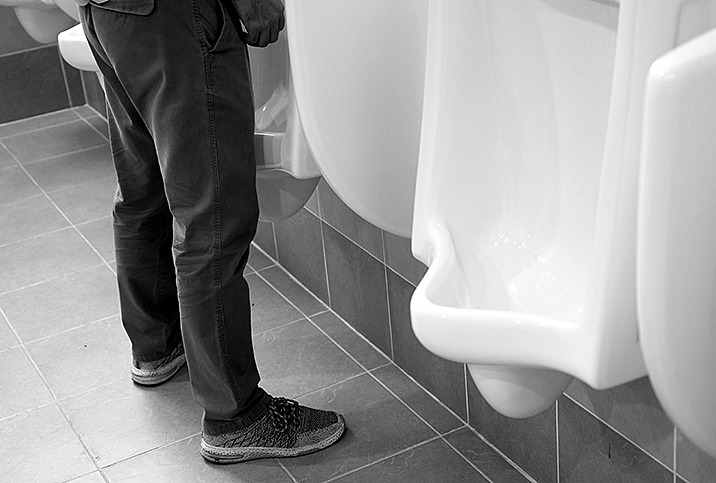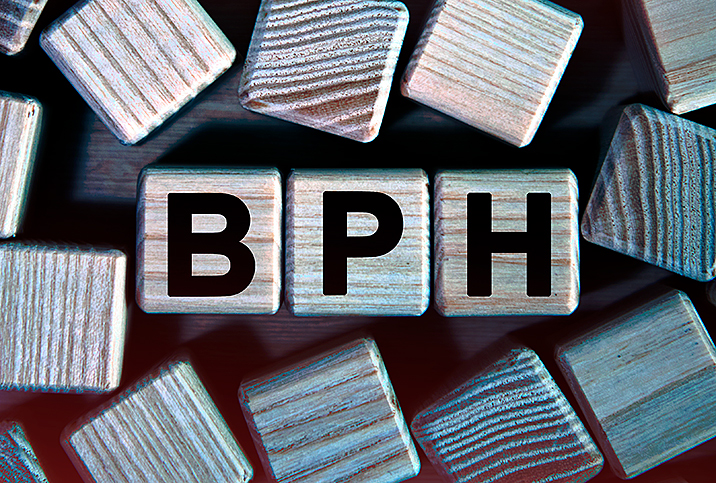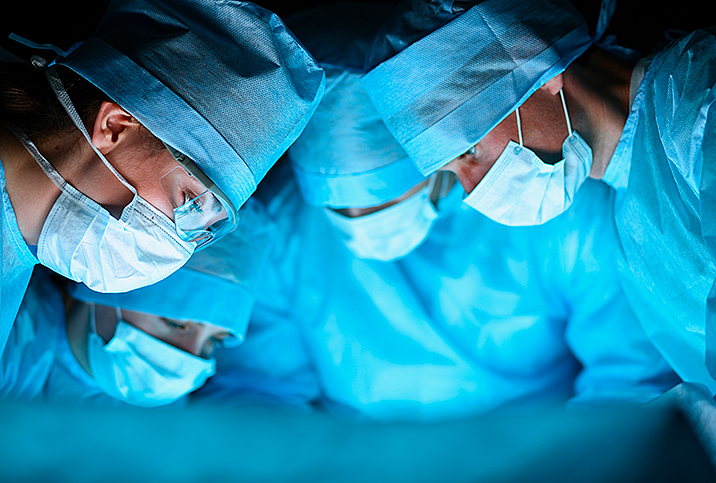7 Lifestyle Adjustments You May Need to Make to Live With BPH

By the time people with benign prostatic hyperplasia (BPH) visit urologist Darshan Patel, M.D., they've likely already seen their primary care doctor. They may have tried medications that either are not working or are causing adverse side effects. Fortunately, for many patients with BPH, the condition can be managed with lifestyle changes.
People with BPH whose symptoms are not especially bothersome may opt for active surveillance, or the watchful waiting approach. This involves keeping an eye on the symptoms and forgoing medical or surgical intervention.
"It's more of a quality-of-life kind of thing," said Patel, an assistant professor of urology at University of California San Diego Health. "If they feel they can manage their symptoms and proceed with a lot of their normal daily activities without making a lot of accommodations, then this line of management makes sense."
A common but troublesome condition
Simply put, BPH is the age-related enlargement of the prostate, not inflammation caused by an infection, which is prostatitis. A very common condition, BPH affects about half of men in their 50s, according to the American Urological Association. By age 80, up to 90 percent of men experience urinary symptoms related to BPH.
The most common urinary symptoms of BPH are the sensation of incomplete emptying, a weak stream, nocturia (waking up in the middle of the night to urinate), and the increased urgency and frequency of urination.
According to urologist Jesse Mills, M.D., the director of the Men's Clinic at UCLA in Los Angeles and the author of the new book "A Field Guide to Men's Health," symptoms of BPH can be divided into two categories: obstructive and irritative.
Obstructive symptoms stem from the prostate getting so large that the bladder has to work harder to squeeze out the urine. Decreased force of stream is a common obstructive symptom.
Irritative symptoms include urinating frequently and nocturia. The diagnostic workup and lifestyle modifications are slightly different depending on the types of symptoms, Mills said.
Before anyone can make the appropriate lifestyle modifications, it's important to figure out what urinary symptoms are most troublesome. Since not all BPH cases are the same, it's best to talk with a urologist about your symptoms to determine which lifestyle modifications are best.
1. Drink less fluid, especially after dinner
If you're getting up in the middle of the night to urinate, it's important to limit your fluid intake after dinner. Patel recommended that BPH sufferers stick to sips of water before bedtime to decrease the likelihood of nocturia.
"It's really important for guys, especially if they get new-onset nocturia where they're peeing a lot at night, to make sure they get a visit with their primary doc to make sure they aren't developing diabetes," Mills said, adding that frequent urination, especially at night, is one of the classic signs of diabetes.
Mills said it's important people with BPH ensure they don't guzzle water during the day. A lot of information sources tell us that we don't drink enough water, he said, but the main goal is just to drink when you're thirsty.
2. Eat a healthy diet
Mills recommended eating a diet rich in green, leafy vegetables and berries, which are great sources of antioxidants. Data coming out of UCLA indicate the antioxidants and properties in pomegranate can help with urination, Mills added.
Eating a healthy, balanced diet also means avoiding processed foods, which are more likely to be bladder irritants, Patel said.
"Processed and sugary things can set off worsening urinary symptoms," he said.
3. Avoid alcohol, caffeine and other bladder irritants
Alcohol acts as a diuretic, meaning it can make you urinate even more fluid than you drink.
"If you drink a 12-ounce beer, that may make 14 ounces of pee because it does dehydrate you through a hormonal mechanism," Mills explained. "If you're drinking at night, you have a lot more fluid. And alcohol doesn't cause you to sleep as well, so it causes you to never get into a deep sleep. You have a bigger chance of waking up to pee more often."
Other potential bladder irritants include caffeine, chocolate and spicy foods.
"Overall, anything you're taking in excessively potentially could be a bladder irritant," Patel said. "Exercise caution and, more so, focus on balancing your diet."
4. Lose weight
Maintaining a healthy weight is definitely important for managing BPH symptoms, Patel said, adding that being overweight is associated with lower urinary tract symptoms (LUTS). Men at a healthy weight tend to have smaller prostates and fewer urinary symptoms compared with guys who are overweight.
"Inflammation is likely the cause of why the guys that are overweight tend to have worsening urination problems," Patel said. "That inflammation is related to the hormone component of prostate enlargement."
5. Manage stress
Men who are stressed and anxious from work or their home life can experience worsening urinary symptoms, Patel said. Meditating, practicing mindfulness, doing deep-breathing exercises, going for a walk outside and engaging in positive self-talk are just a few of the many simple stress-management techniques.
6. Avoid certain medications
The decongestant Sudafed (pseudoephedrine) can make urinary symptoms worse because it is an alpha agonist, making it the opposite of alpha blockers, a class of drug often prescribed to help improve urination symptoms.
"The decongestants cause the prostate to swell, and so guys that are on the borderline of not being able to pee, you put them on Sudafed and all of a sudden, that can clamp down the prostate and make it so they can't pee at all," Mills said. "Older guys who have not had a prostate evaluation should be pretty careful before they take a decongestant."
Water pills used for high blood pressure can also worsen urinary symptoms. If it's a medication someone must have, Patel recommended figuring out the ideal time to take it.
"Some guys that are taking them at night may be better off taking them earlier in the day or midafternoon, so they don't experience that diuretic effect in the middle of the night," he said.
7. Practice 'double voiding'
"Double voiding" means urinating as much as you possibly can, relaxing for a few moments, then doing it again. This strategy may help the bladder empty more effectively when urine is left in the bladder.
"Especially with the morning void or before going to bed, it's always important to ensure that you empty the bladder to the best of your ability," Patel said, adding that double voiding can be especially helpful in decreasing urgency and frequency-related symptoms.
Many men experience symptom relief from these lifestyle modifications. However, if BPH symptoms are making you change your day-to-day activities or you are having to locate the bathroom as soon as you arrive at a new place, you might need something beyond lifestyle changes.
"Those are really the guys that are really going to benefit from more involved therapy, either medical or surgical," Patel said. "That's really what it comes down to in the conversation that we initially have when they come to see us for these symptoms."


















